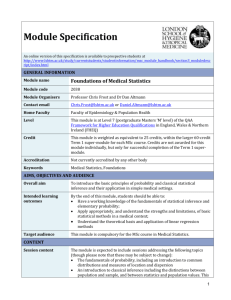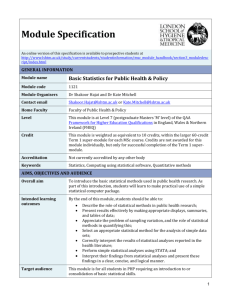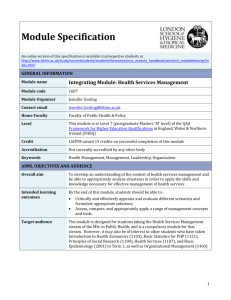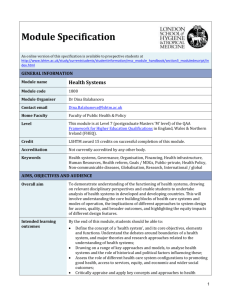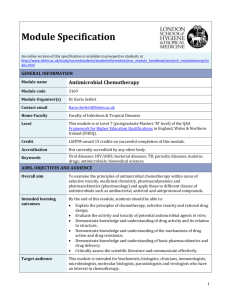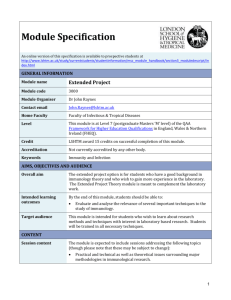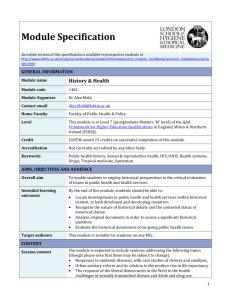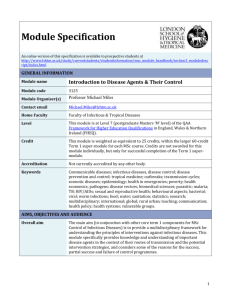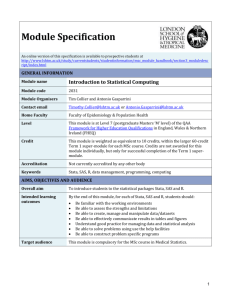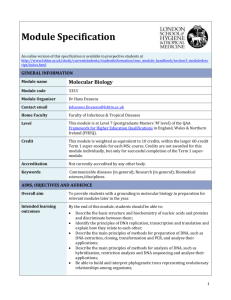3141 Vector Sampling, Identification & Incrimination Module
advertisement
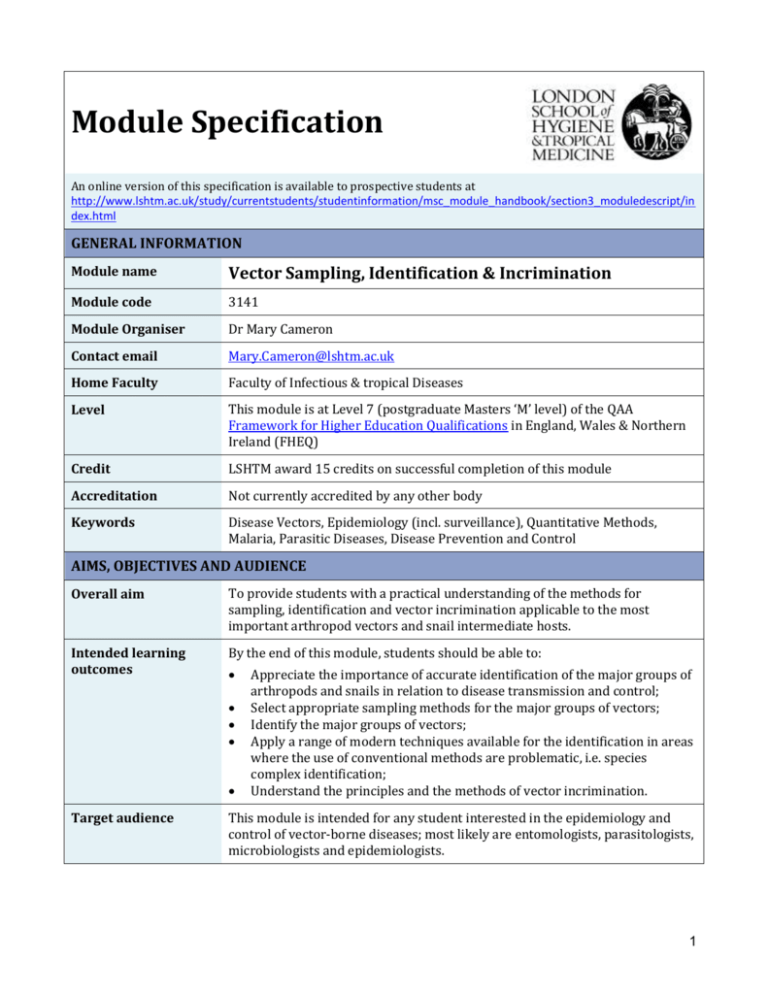
Module Specification An online version of this specification is available to prospective students at http://www.lshtm.ac.uk/study/currentstudents/studentinformation/msc_module_handbook/section3_moduledescript/in dex.html GENERAL INFORMATION Module name Vector Sampling, Identification & Incrimination Module code 3141 Module Organiser Dr Mary Cameron Contact email Mary.Cameron@lshtm.ac.uk Home Faculty Faculty of Infectious & tropical Diseases Level This module is at Level 7 (postgraduate Masters ‘M’ level) of the QAA Framework for Higher Education Qualifications in England, Wales & Northern Ireland (FHEQ) Credit LSHTM award 15 credits on successful completion of this module Accreditation Not currently accredited by any other body Keywords Disease Vectors, Epidemiology (incl. surveillance), Quantitative Methods, Malaria, Parasitic Diseases, Disease Prevention and Control AIMS, OBJECTIVES AND AUDIENCE Overall aim To provide students with a practical understanding of the methods for sampling, identification and vector incrimination applicable to the most important arthropod vectors and snail intermediate hosts. Intended learning outcomes By the end of this module, students should be able to: Target audience Appreciate the importance of accurate identification of the major groups of arthropods and snails in relation to disease transmission and control; Select appropriate sampling methods for the major groups of vectors; Identify the major groups of vectors; Apply a range of modern techniques available for the identification in areas where the use of conventional methods are problematic, i.e. species complex identification; Understand the principles and the methods of vector incrimination. This module is intended for any student interested in the epidemiology and control of vector-borne diseases; most likely are entomologists, parasitologists, microbiologists and epidemiologists. 1 CONTENT Session content The module is expected to include sessions addressing the following topics (though please note that these may be subject to change): Introduction to both traditional and modern techniques, including morphological keys, cytotaxonomy and PCR Species complexes in relation to biology and control Sampling and identification of: mosquitoes; blackflies; phlebotomine sandflies; tsetse flies; triatomine bugs; blackflies; and snails Current research at a major reference centre Vector incrimination TEACHING, LEARNING AND ASSESSMENT Study resources provided or required Study resources provided include the 3141 Course Handbook (including a reader), a Preparation of Material Handbook (A Guide to the Preparation of Medically Important Insects and Acarines for Identification and Preservation), and the 3122 Entomology Handbook. Teaching and learning methods This module is predominately laboratory-based with the ratio of contact time in practicals: lectures roughly 2:1. The practical sessions are an important point for extensive personal interaction with teaching staff both in terms of practical skills as well as to support the theoretical content of the lectures. Students will gain hands-on experience of preparation of material, dissection, identification keys, crossing experiments, cytogenetics and the use of PCR. A one day visit is made to the research laboratories of the Natural History Museum. Assessment details A one hour practical test relating to practical sessions and a one hour short answer test relating to lecture material. The two tests have equal weighting. For students who are required to re-sit, or granted a deferral or new attempt, the tasks will be a practical exam with questions relating to material covered during practical sessions (does not require a laboratory) and a short answer theory exam. Assessment dates Assessments will take place during the morning of the last day of the module (Wednesday 23 March 2016). For students who are required to re-sit, or granted a deferral or new attempt, the next assessment date will be the standard School-recommended date in mid/late September 2016. Language of study and assessment English (please see ‘English language requirements’ below regarding the standard required for entry). TIMING AND MODE OF STUDY Duration The module runs for 5 weeks at 2.5 days per week; this module runs between Monday morning and Wednesday lunchtime 2 Dates For 2015-16, the module will start on Monday 22 February 2016 and finish on Wednesday 23 March 2016. Timetable slot The module runs in LSHTM timetable slot D1 Mode of Study The module is taught face-to-face in London. Both full-time and part-time students follow the same schedule. For full-time students, other LSHTM modules are available in the other half of the week for the C and D slots. Learning time The notional learning time for the module totals 150 hours, consisting of: Contact time ≈ 63 hours Directed self-study ≈ 10 hours Self-directed learning ≈ 31 hours Assessment, review and revision ≈ 46 hours APPLICATION, ADMISSION AND FEES Pre-requisites To gain full benefit from this module, a basic prior knowledge of, and an interest in, vectors is recommended English language requirements A strong command of the English language is necessary to benefit from studying the module. Applicants whose first language is not English or whose prior university studies have not been conducted wholly in English must fulfil LSHTM’s English language requirements, with an acceptable score in an approved test taken in the two years prior to entry. Applicants may be asked to take a test even if the standard conditions have been met. Student numbers Student numbers are typically 25 per year; numbers may be capped due to limitations in facilities or staffing. Student selection Preference will be given to LSHTM MSc students [particularly those registered for MEDiC and MP] and LSHTM research degree students. Other applicants meeting the entry criteria will usually be offered a place in the order applications are received, until any cap on numbers is reached. Applicants may be placed on a waiting list and given priority the next time the module is run. Full Registration (full participation) by LSHTM research degree students is required for this module. Fees For registered LSHTM MSc students, fees for the module are included within MSc fees (given on individual course prospectus pages). If registering specifically for this module, as a stand-alone short course, individual module fees will apply. Tuition fees must be paid in full before commencing the module, or by any fee deadline set by the Registry. Scholarships Scholarships are not available for individual modules. Some potential sources of funding are detailed on the LSHTM website. 3 Admission deadlines For 2015-16: For registered LSHTM MSc students, the module choice deadline (for Term 2 and 3 modules) is Friday 20 November 2015. If registering specifically for this module, applications may be made at any time but, as places are limited, applications ahead of the MSc deadline are strongly advised. All applications should be submitted at the latest 8 weeks prior to the start of the module. Formal registration will take place on the morning of the first day of the module. ABOUT THIS DOCUMENT This module specification applies for the academic year 2015-16 Last revised 8 July 2013 by Mary Cameron; Minor amendments 20 July 15 SDB London School of Hygiene & Tropical Medicine, Keppel St., London WC1E 7HT. www.lshtm.ac.uk 4

